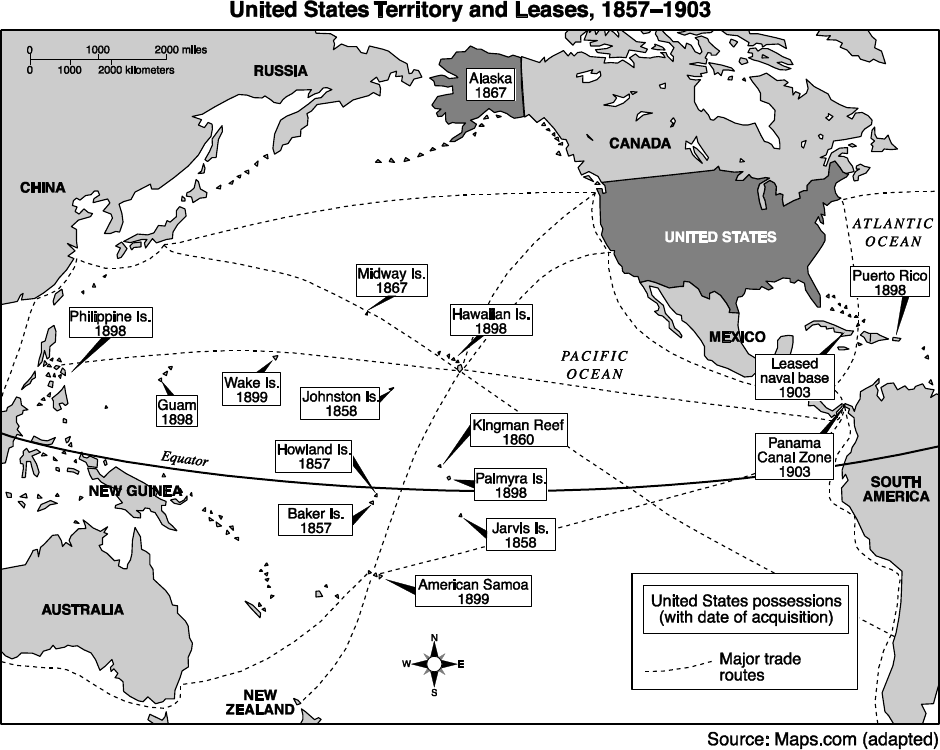
Part III
Civic Literacy Essay Question
Sample Student Papers
Regents Examination
in United States History
and Government (Framework)
First Administration
June 2021
2

Table of Contents
Part III Civic Literacy Essay Question ..........................................................4
Part IIIA Question-Specific Rubric.............................................................. 13
Part IIIB Content-Specific Rubric ............................................................... 17
Scoring Worksheets for Training:
Scoring Worksheet-A ............................................................................................................. 24
Scoring Worksheet-B ............................................................................................................. 27
Anchor Papers–Score Levels 5 to 1 .............................................................. 29
Practice Papers ............................................................................................... 43
Practice Paper Commentaries................................................................................................ 51
3

NAME SCHOOL
Part III
CIVIC LITERACY ESSAY (Questions 31–37)
This Civic Literacy Essay Question is based on the accompanying documents. The question is
designed to test your ability to work with historical documents. Some of these documents have been
edited for the purpose of this question. As you analyze the documents, take into account the source
of each document and any point of view that may be presented in the document. Keep in mind that
the language and images used in a document may reflect the historical context of the time in which
it was created.
Historical Context: Imperialism in the 1890s
Throughout United States history, many constitutional and civic issues have
been debated by Americans. These debates have resulted in efforts by
individuals, groups, and governments to address these issues. These efforts
have achieved varying degrees of success. One of these constitutional and civic
issues is imperialism in the 1890s.
Task: Read and analyze the documents. Using information from the documents and
your knowledge of United States history, answer the questions that follow each
document in Part A. Your answers to the questions will help you write the Part
B essay in which you will be asked to
• Describe the historical circumstances surrounding this constitutional or
civic issue
• Explain efforts by individuals, groups, and/or governments to address this
constitutional or civic issue
• Discuss the extent to which the efforts were successful
In developing your answers to Part III, be sure to keep these general definitions in mind:
(a) describe means “to illustrate something in words or tell about it”
(b) explain means “to make plain or understandable; to give reasons for or causes of;
to show the logical development or relationships of”
(c) discuss means “to make observations about something using facts, reasoning, and
argument; to present in some detail”
4

Civic Literacy Essay
Part A
Short-Answer Questions (31–36)
Directions: Analyze the documents and answer the questions that follow each document in the
space provided.
Document 1
. . . By the 1890s any U.S. interest in the actual annexation of territory had given way to
“informal empire,” or commercial penetration that led either to economic dominance without
direct political controls or to the acquisition of colonies having no prospect of statehood.
The expansionist mood was not national, partly because of the lack of coherence in the
political parties, and partly because of the general fragmentation still evident from the Civil
War. Anti-imperialist feelings ran strong, especially among Americans who recognized their
nation’s limitations outside the hemisphere, but also among those who feared the
incorporation of non-white peoples and worried about the negative effects of imperialism on
democratic institutions. But the economic hard times of the decade dictated a search for new
commercial outlets, not so much for acquiring raw materials as for securing markets capable
of absorbing the United States’s excess stock of manufactured goods. Although business and
government did not jointly orchestrate a push toward expansion, commercial interests often
had the Washington government’s tacit support in searching for investment fields and
foreign markets that would promote the good of the economy and hence safeguard the
national interest. . . .
Source: Howard Jones, Crucible of Power: A History of American Foreign Relations to 1913,
Scholarly Resources, Inc., 2002
31 According to Howard Jones, what is one historical circumstance that led to support for
United States expansion overseas in the 1890s? [1]
5
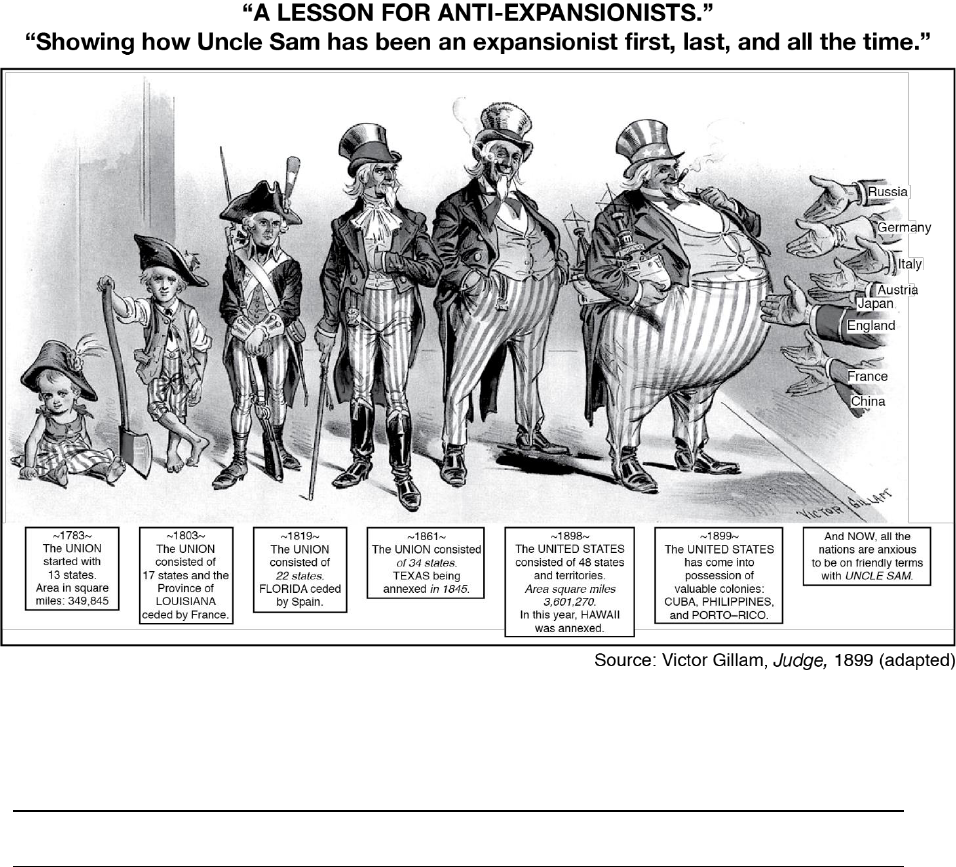
Document 2
32 Based on this document, state one historical circumstance that supports American expansion in the
1890s. [1]
6

Document 3
While running for the United States Senate in 1898, Albert Beveridge argued in favor of American
expansion.
. . . In Cuba, alone, there are 15,000,000 acres of forest unacquainted with the ax, exhaustless
mines of iron, priceless deposits of manganese, millions of dollars’ worth of which we must
buy, today, from the Black Sea districts. There are millions of acres yet unexplored.
The resources of Porto Rico have only been trifled with. The riches of the Philippines
have hardly been touched by the fingertips of modern methods. And they produce what we
consume, and consume what we produce—the very predestination of reciprocity—a
reciprocity “not made with hands, eternal in the heavens.” They sell hemp, sugar, cocoanuts,
fruits of the tropics, timber of price like mahogany; they buy flour, clothing, tools,
implements, machinery and all that we can raise and make. Their trade will be ours in time.
Do you indorse [endorse] that policy with your vote?
American merchants, manufacturers, farmers, have as good right as those of Germany or
France or Russia or England; Asia, whose commerce with the United Kingdom amounts to
hundreds of millions of dollars every year; Asia, to whom Germany looks to take her surplus
products; Asia, whose doors must not be shut against American trade. . . .
Source: Albert Beveridge, “The March of the Flag” speech, September 16, 1898
33 According to Albert Beveridge, what is one reason to support American expansion overseas? [1]
7

Document 4a
Platform of the American Anti-Imperialist League
We hold that the policy known as imperialism is hostile to liberty and tends toward
militarism, an evil from which it has been our glory to be free. We regret that it has become
necessary in the land of Washington and Lincoln to reaffirm that all men, of whatever race
or color, are entitled to life, liberty and the pursuit of happiness. We maintain that
governments derive their just powers from the consent of the governed. We insist that the
subjugation of any people is “criminal aggression” and open disloyalty to the distinctive
principles of our Government. . . .
We demand the immediate cessation of the war against liberty, begun by Spain and
continued by us. We urge that Congress be promptly convened to announce to the Filipinos
our purpose to concede to them the independence for which they have so long fought and
which of right is theirs.
The United States have always protested against the doctrine of international law which
permits the subjugation of the weak by the strong. A self-governing state cannot accept
sovereignty over an unwilling people. The United States cannot act upon the ancient heresy
that might makes right. . . .
Source: Carl Schurz, Address at the Anti-Imperialistic Conference in Chicago, October 17, 1899
Document 4b
Democratic Party Platform
. . . We hold that the Constitution follows the flag, and denounce the doctrine that an
Executive or Congress deriving their existence and their powers from the Constitution can
exercise lawful authority beyond it or in violation of it. We assert that no nation can long
endure half republic and half empire, and we warn the American people that imperialism
abroad will lead quickly and inevitably to despotism at home. . . .
The greedy commercialism which dictated the Philippine policy of the Republican
administration attempts to justify it with the plea that it will pay; but even this sordid [greedy]
and unworthy plea fails when brought to the test of facts. The war of “criminal aggression”
against the Filipinos, entailing an annual expense of many millions, has already cost more
than any possible profit that could accrue from the entire Philippine trade for years to come.
Furthermore, when trade is extended at the expense of liberty, the price is always too
high. . . .
Source: Democratic Party Platform, July 4, 1900
34 Based on these documents, what was one reason for opposition to American imperialism? [1]
8

Document 5
Republican Party Platform
. . . In accepting by the Treaty of Paris the just responsibility of our victories in the Spanish
war, the President [McKinley] and the Senate won the undoubted approval of the American
people. No other course was possible than to destroy Spain’s sovereignty throughout the
West Indies and in the Philippine Islands. That course created our responsibility before the
world, and with the unorganized population whom our intervention had freed from Spain, to
provide for the maintenance of law and order, and for the establishment of good government
and for the performance of international obligations. Our authority could not be less than our
responsibility; and wherever sovereign rights were extended it became the high duty of the
Government to maintain its authority, to put down armed insurrection and to confer the
blessings of liberty and civilization upon all the rescued peoples. . . .
Source: Republican Party Platform, June 19, 1900
35 Based on this document, what was one reason the Republican Party supported American
imperialism? [1]
9

Document 6b
. . . Those who first pushed the United States toward global military power—the
expansionists of 1898—may also claim a measure of vindication. They believed that taking
Cuba, the Philippines, and other island nations would be the first steps toward a world largely
dominated by American power. That world emerged much as they imagined. Entire regions
fell under the formal or informal control of the United States. This gave Americans almost
unlimited access to the world’s markets and resources. In the space of just a few generations,
the United States reached levels of national wealth unmatched in human history. This
prosperity helped propel Americans to victory in two world wars and the Cold War. Henry
Cabot Lodge was right when he predicted that overseas expansion would bring “enormous
material benefits to our trade, our industry, and our labor.”
Imperialists believed that American influence would benefit the whole world. This, they
argued, would happen in two ways. First, Americans who intervened in foreign countries
would bring the material blessings of civilization: good schools, orderly systems of justice,
modern transport networks, new jobs, control of tropical diseases. Second, even in places
where such tangible benefits did not take hold, rising American power would be good for
everyone simply because it meant strengthening the world’s most beneficent [generous]
nation. . . .
Source: Stephen Kinzer, The True Flag: Theodore Roosevelt, Mark Twain
and the Birth of an American Empire, 2017
36 Based on these documents, what was one result of American expansion in the late 1800s? [1]
11

Part B
Civic Literacy Essay Question (37)
Directions: Write a well-organized essay that includes an introduction, several paragraphs, and a conclusion.
Use evidence from at least four documents in the body of the essay. Support your response with
relevant facts, examples, and details. Include additional outside information.
Historical Context: Imperialism in the 1890s
Throughout United States history, many constitutional and civic issues have
been debated by Americans. These debates have resulted in efforts by
individuals, groups, and governments to address these issues. These efforts
have achieved varying degrees of success. One of these constitutional and civic
issues is imperialism in the 1890s.
Task: Using information from the documents and your knowledge of United States
history, write an essay in which you
• Describe the historical circumstances surrounding this constitutional or
civic issue
• Explain efforts by individuals, groups, and/or governments to address this
constitutional or civic issue
• Discuss the extent to which the efforts were successful
Guidelines:
In your essay, be sure to
• Develop all aspects of the task
• Explain at least two efforts to address this issue
• Incorporate information from at least four documents
• Incorporate relevant outside information
• Support the theme with relevant facts, examples, and details
• Use a logical and clear plan of organization, including an introduction and conclusion that are
beyond a restatement of the theme
12

CIVIC LITERACY ESSAY QUESTION
SAMPLE RATING GUIDE
Imperialism in the 1890s
Part IIIA
Question-Specific Rubric
(Questions 31–36)
31 According to Howard Jones, what is one historical circumstance that led to support for United
States expansion overseas in the 1890s?
Score of 1:
• States a historical circumstance that led to support for United States expansion overseas in the 1890s
according to Howard Jones
Examples: need for investment fields and foreign markets that would promote the good of the
economy/safeguard national interest; economic hard times of the decade dictated a
search for new commercial outlets; need to find places to sell excess stock of
manufactured goods; desire for commercial penetration that would lead to economic
dominance; tacit support for commercial interests from government in Washington
Score of 0:
• Incorrect response
Examples: lack of coherence of political parties; negative effects of imperialism on democratic
institutions; fear of incorporation of non-white peoples; presence of strong anti-
imperialist feelings among Americans, who recognized nation’s limitations outside of
hemisphere
• No response
13

32 Based on this document, state one historical circumstance that supports American expansion in
the 1890s.
Score of 1:
• States a historical circumstance that supports American expansion in the 1890s based on this
document
Examples: United States has been an expansionist nation since its birth; United States has been
constantly growing; tradition of expansion, such as annexation of Texas by the United
States in 1845; United States grew to over 3 million square miles by the 1890s;
possession of valuable colonies in Cuba/Philippines/Puerto Rico; several acquisitions
were made to expand the United States; foreign nations were extending a welcoming
hand to the United States/wanted to be on friendly terms with Uncle Sam
Score of 0:
• Incorrect response
Examples: lesson for anti-imperialists; in 1861 the Union consisted of 34 states;
Germany/Russia/Italy/Austria/Japan/England/France/China helped the United States
expand; just kept getting bigger
• No response
33 According to Albert Beveridge, what is one reason to support American expansion overseas?
Score of 1:
• States a reason to support American expansion overseas according to Albert Beveridge
Examples: territories will benefit from American expansion; for economic growth; to control
other territories; for world power; Cuba/Puerto Rico/Philippines have resources we
need; we have the right to increase our commerce in Asia; Cuba/Puerto
Rico/Philippines produce what we consume and consume what we produce; American
merchants/manufacturers/farmers have the same rights to foreign markets/natural
resources as those of Germany/France/Russia/England
Score of 0:
• Incorrect response
Examples: resources have been trifled with; it would touch fingertips of modern methods;
America can raise and make our own goods; Asia must be closed to American trade;
the Black Sea districts are in Cuba; Germany has surplus products
• No response
14

34 Based on these documents, what was one reason for opposition to American imperialism?
Score of 1:
• States a reason for opposition to American imperialism based on these documents
Examples: it is hostile to liberty; it tends toward militarism; subjugation of any people is criminal
aggression/open disloyalty to the distinctive principles of our government; a self-
governing state cannot accept sovereignty over an unwilling people; United States
cannot act upon the ancient heresy that might makes right; that all men, of whatever
race or color, are entitled to life/liberty/pursuit of happiness; the Filipinos have fought
for/have the right to their independence; to reaffirm that governments derive their just
powers from the consent of the governed; idea that might makes right is an ancient
heresy; no nation can long endure half republic and half empire; the
President/Congress cannot exercise lawful authority beyond/in violation of the
Constitution; imperialism abroad will lead quickly/inevitably to despotism at home;
war against the Filipinos has cost more than any profit that could accrue from trade;
belief that in the land of Washington and Lincoln, all men of any race or color are
entitled to life, liberty, and the pursuit of happiness
Score of 0:
• Incorrect response
Examples: imperialism is an important United States policy; it is in the platform; in the land of
Washington and Lincoln; belief in subjugation of people
• No response
35 Based on this document, what was one reason the Republican Party supported American
imperialism?
Score of 1:
• States a reason the Republican Party supported American imperialism based on this document
Examples: with the acceptance of the Treaty of Paris it had the approval of the American people;
destruction of Spain’s sovereignty in the West Indies/the Philippines created American
responsibility before the world; it would provide for the performance of international
obligations; United States authority could not be less than our responsibility; it was the
duty of the United States government to maintain its authority/to put down
insurrection/to confer the blessings of liberty and civilization upon all rescued peoples
Score of 0:
• Incorrect response
Examples: the defeat of the Treaty of Paris by the American people; the war gave Spain control of
the West Indies/the Philippine Islands; the Spanish government ended resurrection;
population was unorganized
• No response
15

36 Based on these documents, what was one result of American expansion in the late 1800s?
Score of 1:
• States a result of American expansion in the late 1800s based on these documents
Examples: large number of trade routes developed across Pacific Ocean; many islands became
United States possessions; United States empire grew in the Pacific; United States
became a world power; Alaska acquired in 1867; American trade increased; United
States expanded; United States emerged as world power/global military power;
Americans got almost unlimited access to world’s markets/resources; United States
reached levels of national wealth unmatched in human history; prosperity helped
propel Americans to victory in two world wars/Cold War; overseas expansion brought
enormous material benefits to our trade/industry/labor; entire regions fell under
formal/informal control of United States; Americans who intervened in foreign
countries would bring material blessings of civilization/good schools/orderly system of
justice/modern transport networks/new jobs/control of tropical diseases
Score of 0:
• Incorrect response
Examples: Australia became a United States possession; the United States ruled the world; New
Guinea became part of the United States; access to world markets was reduced
• No response
16

Part IIIB
Content-Specific Rubric
(Question 37)
Historical Context: Imperialism in the 1890s
Throughout United States history, many constitutional and civic issues have been debated by
Americans. These debates have resulted in efforts by individuals, groups, and governments to address
these issues. These efforts have achieved varying degrees of success. One of these constitutional and
civic issues is imperialism in the 1890s.
Task:
• Describe the historical circumstances surrounding this constitutional or civic issue
• Explain efforts by individuals, groups, and/or governments to address this constitutional or civic issue
• Discuss the extent to which the efforts were successful
Scoring Notes:
1. This civic literacy essay has a minimum of four components (describing the historical circumstances
surrounding imperialism in the 1890s, explaining at least two efforts to address the issue by
individuals, groups, and/or governments, and discussing the extent to which the efforts were
successful).
2. The efforts to address the issue of imperialism in the 1890s may focus on efforts by individuals,
groups, governments, or any combination of these.
3. Individuals, groups, and/or governments do not need to be specifically identified as long as they are
implied in the discussion.
4. The efforts to address the issue of imperialism in the 1890s may be from the perspective of supporters
or opponents of imperialism.
5. The same or similar information may be used to address more than one aspect of the task as long as
the information is relevant to the aspect of the task being addressed, e.g., “consent of the governed”
may be discussed as both part of the historical circumstances and part of the position of opponents in
the debate over imperialism.
6. The explanation of efforts to address the issue of imperialism in the 1890s may be included in the
discussion of the extent to which the efforts were successful.
7. The description of historical circumstances and the extent to which the efforts were successful may
focus on either immediate or long-term circumstances or immediate or long-term results.
8. The response may discuss efforts to address the issue and the extent to which the efforts were
successful from different perspectives as long as the position taken is supported by accurate historical
facts and examples.
9. For the purpose of meeting the criteria of using at least four documents in the response, documents
4a, 4b, 6a, and 6b may be considered separate documents if the response uses specific information
from each selected document.
17
Score of 5:
• Thoroughly develops all aspects of the task evenly and in depth by describing the historical
circumstances surrounding imperialism in the 1890s, explaining at least two efforts to address the
issue of imperialism in the 1890s by individuals, groups, and/or governments, and discussing the
extent to which the efforts were successful
• Is more analytical than descriptive (analyzes, evaluates, and/or creates* information), e.g., connects
the long tradition of American expansion and the interest in expanding trade opportunities as a result
of the post–Civil War industrial and commercial developments to the national, political, and
constitutional debates over annexation of the Philippines and the Filipino-American War to the
commercial and strategic military opportunities gained from territorial acquisitions after the Spanish-
American War as well as the increased responsibilities of becoming a colonial/world power
• Incorporates relevant information from at least four documents (see Key Ideas From Documents
chart)
• Incorporates substantial relevant outside information (see Relevant Outside Information chart)
• Richly supports the theme with many relevant facts, examples, and details, e.g., Spanish-American
War; Social Darwinism; gained Guam, Puerto Rico, Cuba, and Philippines; “consent of the
governed”; Platt Amendment; Emilio Aguinaldo; “benevolent assimilation”; Open Door policy;
Roosevelt Corollary; Panama Canal
• Demonstrates a logical and clear plan of organization; includes an introduction and a conclusion that
are beyond a restatement of the theme
Score of 4:
• Develops all aspects of the task but may do so somewhat unevenly by discussing one aspect of the
task less thoroughly than the other aspects of the task
• Is both descriptive and analytical (applies, analyzes, evaluates, and/or creates* information), e.g.
discusses the interest in expanding trade opportunities as a result of post–Civil War industrial and
commercial development and reasons for the national debate over annexation of the Philippines and
the commercial opportunities and world-power status achieved through territories acquired after the
Spanish-American War
• Incorporates relevant information from at least four documents
• Incorporates relevant outside information
• Supports the theme with relevant facts, examples, and details
• Demonstrates a logical and clear plan of organization; includes an introduction and a conclusion that
are beyond a restatement of the theme
Score of 3:
• Develops all aspects of the task with little depth or develops at least three aspects of the task in some
depth
• Is more descriptive than analytical (applies, may analyze and/or evaluate information)
• Incorporates some relevant information from some of the documents
• Incorporates limited relevant outside information
• Includes some relevant facts, examples, and details; may include some minor inaccuracies
• Demonstrates a satisfactory plan of organization, includes an introduction and a conclusion that may
be a restatement of the theme
18
Score of 2:
• Minimally develops all aspects of the task or develops at least two aspects of the task in some depth
• Is primarily descriptive; may include faulty, weak, or isolated application or analysis
• Incorporates limited relevant information from the documents or consists primarily of relevant
information copied from the documents
• Presents little or no relevant outside information
• Includes few relevant facts, examples, and details; may include some inaccuracies
• Demonstrates a general plan of organization; may lack focus; may contain digressions; may not
clearly identify which aspect of the task is being addressed; may lack an introduction and/or a
conclusion
Score of 1
• Minimally develops some aspects of the task
• Is descriptive; may lack understanding, application, or analysis
• Makes vague, unclear references to the documents or consists primarily of relevant and irrelevant
information copied from the documents
• Presents no relevant outside information
• Includes few relevant facts, examples, or details; may include inaccuracies
• May demonstrate a weakness in organization; may lack focus; may contain digressions; may not
clearly identify which aspect of the task is being addressed; may lack an introduction and/or a
conclusion
Score of 0:
Fails to develop the task or may only refer to the theme in a general way; OR includes no relevant facts,
examples, or details; OR includes only the historical context and/or task as copied from the test booklet;
OR includes only entire documents copied from the test booklet; OR is illegible; OR is a blank paper
*The term create as used by Anderson/Krathwohl, et al. in their 2001 revision of Bloom’s Taxonomy of Educational
Objectives refers to the highest level of the cognitive domain. This usage of create is similar to Bloom’s use of the term
synthesis. Creating implies an insightful reorganization of information into a new pattern or whole. While a Level 5 paper will
contain analysis and/or evaluation of information, a very strong paper may also include examples of creating information as
defined by Anderson and Krathwohl.
19

Imperialism in the 1890s
Key Ideas From Documents
Historical Circumstances
Doc 1—By 1890s no interest in actual annexation of territory (economic dominance without direct
political controls; acquisition of colonies having no prospect of statehood)
Expansionist mood not national (lack of coherence in political parties; general fragmentation evident from
Civil War)
Presence of strong anti-imperialist feelings (recognition of America’s limitations outside of hemisphere;
fear of incorporation of non-white peoples; worry about negative effects of imperialism on democratic
institutions)
Search for new commercial outlets as result of economic hard times of decade (need for markets capable
of absorbing United States excess stock of manufactured goods)
Tacit support of federal government in searching for investment fields and foreign markets (to promote
the good of the economy; safeguard the national interest)
Doc 2—History of United States is one of expansion (Louisiana ceded by France in 1803; Florida ceded
by Spain in 1819; Texas annexed in 1845; Hawaii annexed in 1898; Cuba, Philippines, and Puerto Rico
added in 1899)
Efforts by political cartoonists to gain support for idea that United States has always been expansionist
Efforts to Address Imperialism
Doc 3—Supporters of expansionism in 1898––Albert Beveridge’s “March of the Flag” speech when
running for United States Senate (15,000,000 acres of forest, exhaustless mines of iron, priceless
deposits of manganese, millions of unexplored acres in Cuba; riches of Puerto Rico hardly touched;
claim that “they produce what we consume, and consume what we produce”; equal access of American
merchants, manufacturers, farmers to those of Germany, France, Russia, or England; access to United
Kingdom’s commerce with Asian markets which should not be shut to American trade)
Doc 4—Platform of American Anti-Imperialist League opposing imperialism (hostile to liberty and tends
toward militarism; all men of whatever race or color entitled to life, liberty, and pursuit of happiness;
subjugation of any people is “criminal aggression” and open disloyalty to principles of United States
government; independence for Cuba and Philippines because they have fought long and hard and it is
their right; history of protest by United States against international law which permits subjugation of
weak by strong; sovereignty over unwilling people cannot be accepted by self-governing state; ancient
heresy “might does not make right” cannot be acted upon by United States)
Democratic Party Platform opposing imperialism (belief that Constitution follows the flag; existence and
powers of president and Congress from Constitution meant they cannot exercise lawful authority beyond
it or violate it; no nation can long endure half republic and half empire; belief that imperialism will lead
quickly and inevitably to despotism at home; cost of “criminal aggression” against Filipinos; more than
any possible profit from trade for years to come; trade to be at expense of liberty for Filipinos)
Doc 5—Support of Republican Party for imperialism (responsibility of United States government to
provide for maintenance of law and order and for establishment of good government and performance of
international obligations; duty of United States government to maintain authority, put down armed
insurrection, and confer blessings of liberty and civilization on all rescued peoples)
20

Imperialism in the 1890s
Key Ideas From Documents (continued)
Extent to Which the Efforts Were Successful
Doc 2—Many nations anxious to be friendly with United States in 1899 (Russia, Germany, Italy, Austria,
Japan, England, France, China)
Doc 5—Treaty of peace with Spain ratified in Treaty of Paris on February 6, 1899 ending Spanish-
American War
Doc 6—American acquisitions in 1898 and after (Philippine Islands, 1898; Guam, 1898; Hawaiian
Islands, 1898; Palmyra Island, 1898; Puerto Rico, 1898; American Samoa, 1899; Wake Island, 1899;
Panama Canal Zone, 1903; naval base leased in Cuba, 1903)
Push by expansionists toward global military power as taking Cuba, the Philippines, and other island
nations first steps toward a world largely dominated by American power
Almost unlimited access gained to world’s markets and resources as entire regions fell under formal or
informal control of United States
Prosperity of United States a reason for American victories in two world wars and Cold War
Henry Cabot Lodge correct in his prediction that overseas expansion would bring “enormous material
benefits to our trade, our industry, and our labor”
Belief of imperialists that American influence would benefit the whole world: material blessings of
civilization brought by Americans who intervened in foreign countries (good schools; orderly system of
justice; modern transportation networks; new jobs; control of tropical diseases); in places where tangible
benefits did not happen then rising American power good for everyone because it would mean
strengthening generosity of America
21

Imperialism in the 1890s
Relevant Outside Information
(This list is not all-inclusive.)
Historical Circumstances
National feeling of “New Manifest Destiny” (United States interest in Caribbean, Pacific, and Asia)
Turning of United States interests toward distant shores with advances of post–Civil War era (industrial;
technological; commercial)
Influence of missionaries and investors in overseas territories (Hawaii, Cuba)
Duty to advance American ideals of democracy and republican government (Josiah Strong’s Our
Country; Social Darwinism; Rudyard Kipling’s White Man’s Burden)
Appeal of new challenges with temporary resolution of domestic issues (Reconstruction; Native
Americans)
Search for new economic opportunities with close of frontier, 1890 (Industrial Revolution)
Diversion from domestic problems (Depression, 1890s; labor violence; agrarian unrest)
Establishment of colonies by Europeans for centuries (competition)
Political and military competition (Mahan’s The Influence of Sea Power on History; strategic bases)
Details about Spanish-American War
Efforts to Address Imperialism
Rebellion against Hawaiian royal rule by planters and businessmen
Rejection of Hawaiian annexation by President Grover Cleveland
Details about divisive national debate over Treaty of Paris, 1898
President McKinley’s decision to annex Philippines
Three-year guerilla war with Philippines (role of Emilio Aguinaldo)
American protectorate established over Cuba (Teller Amendment v. Platt Amendment)
Complicated legal issues with annexation of Puerto Rico (“Does the Constitution follow the flag?”;
Insular Cases)
Theodore Roosevelt’s speeches and writings about benefits of expansion
Speeches of Democratic presidential candidate William Jennings Bryan opposing imperialism
Extent to Which the Efforts Were Successful
Increasing responsibility for policing Western Hemisphere (Roosevelt Corollary; Big Stick Policy)
Acquisition of bases to accommodate expanding navy (Manila; Pearl Harbor)
Power in the Far East for United States (John Hay’s Open Door policy; complications regarding Japanese
expansion pre–World War II)
Theodore Roosevelt’s mediation of Russo-Japanese War
Growth of public interest for an isthmian canal
Offer for military and diplomatic support to businessmen in Caribbean (Dollar Diplomacy)
Details about Puerto Rico (commonwealth; citizenship; current status; migration)
Continued United States presence in Cuba (Guantanamo)
Return of canal to Panama under Carter (current status of Panama Canal)
22
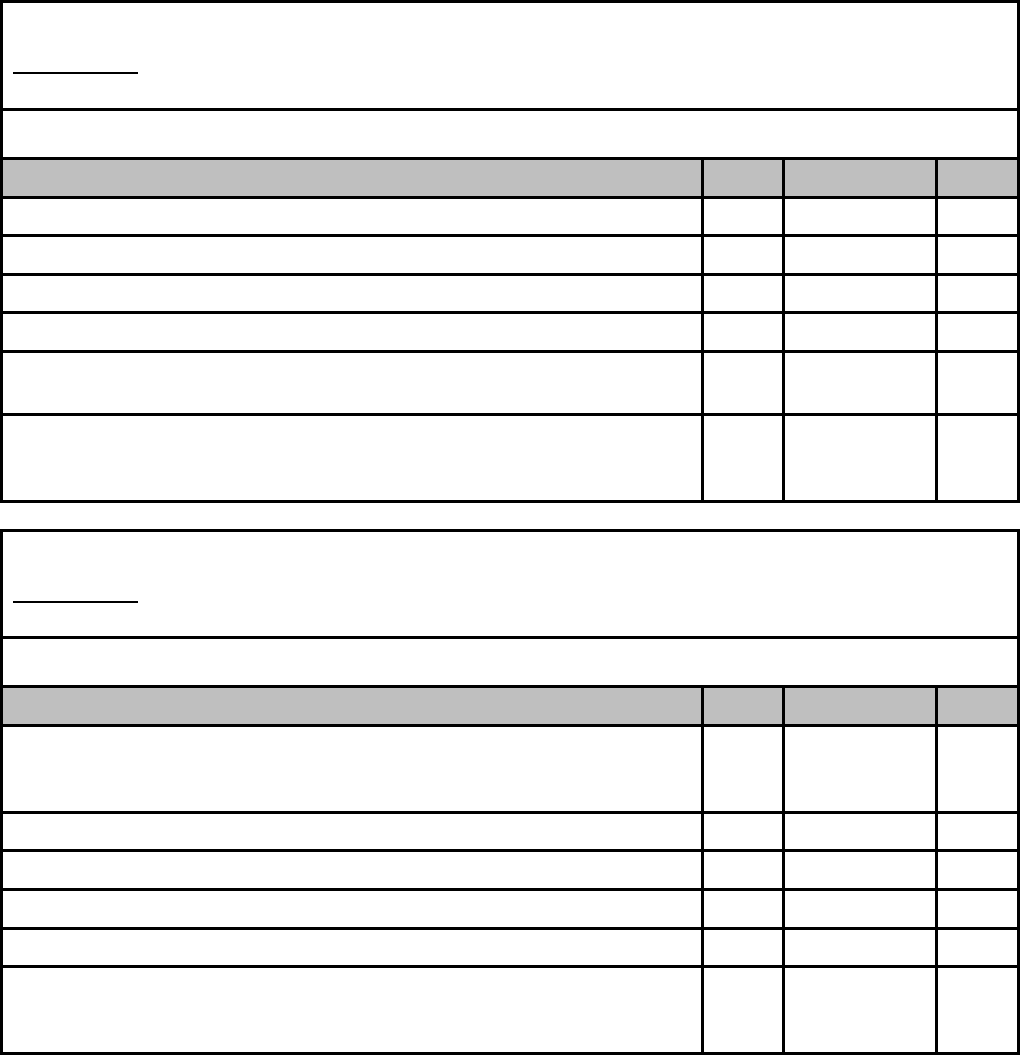
Part III Scoring Worksheet–A
Directions: Read the sample paper and select where each response fits on this scoring continuum. *
Level 5
Meets Criteria
Scoring Criteria
Yes
Somewhat
No
Thoroughly develops all aspects of the task evenly and in depth
Is more analytical than descriptive
Incorporates relevant information from at least four documents
Incorporates substantial relevant outside information
Richly supports the theme with many relevant facts, examples, and
details
Demonstrates a logical and clear plan of organization; includes an
introduction and a conclusion that are beyond a restatement of the
theme
Level 4
Meets Criteria
Scoring Criteria
Yes
Somewhat
No
Develops all aspects of the task but may do so somewhat unevenly by
discussing one aspect of the task less thoroughly than the other aspects
of the task
Is both descriptive and analytical
Incorporates relevant information from at least four documents
Incorporates relevant outside information
Supports the theme with relevant facts, examples, and details
Demonstrates a logical and clear plan of organization; includes an
introduction and a conclusion that are beyond a restatement of the
theme
24
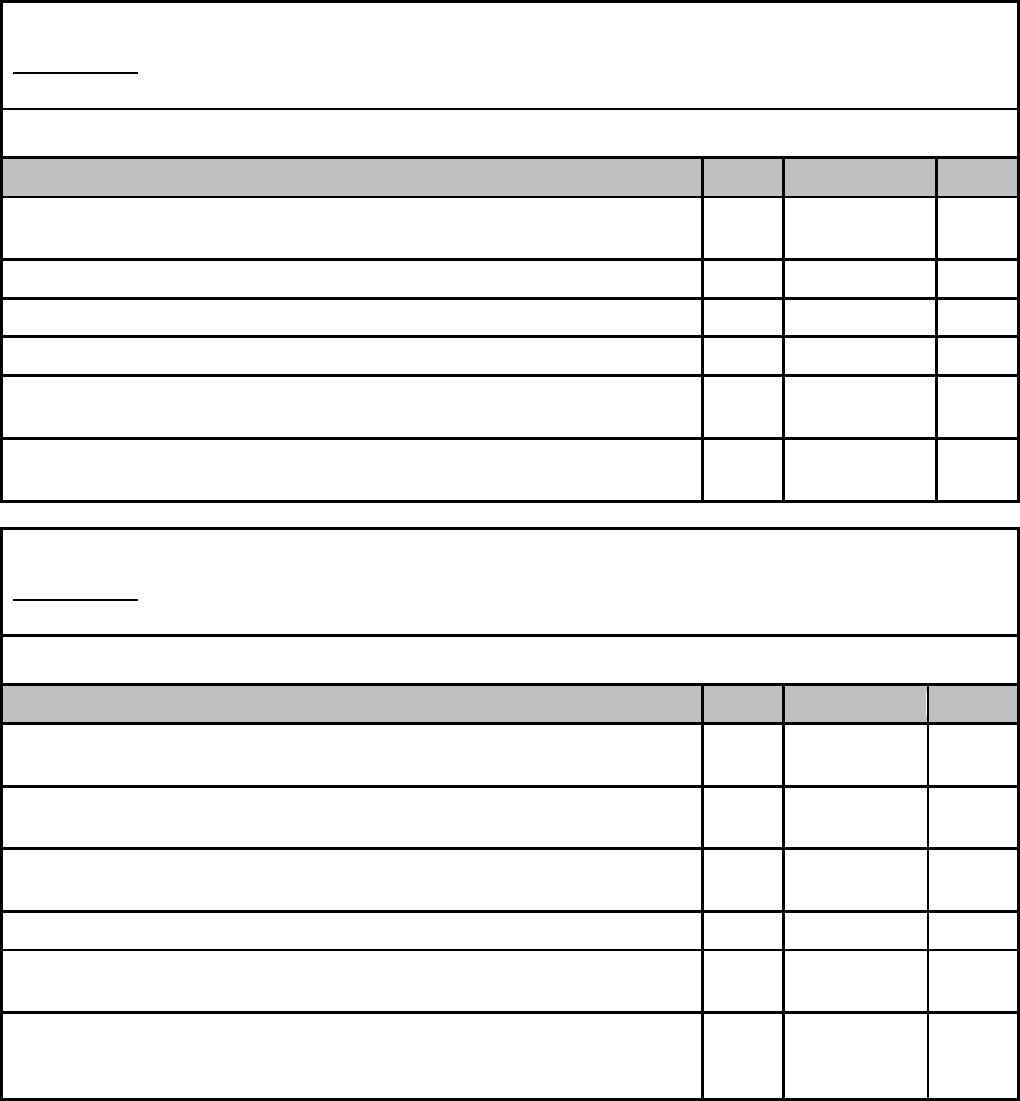
Part III Scoring Worksheet–A
Level 3
Meets Criteria
Scoring Criteria
Yes
Somewhat
No
Develops all aspects of the task with little depth or develops at least
three aspects of the task in some depth
Is more descriptive than analytical
Incorporates some relevant information from some of the documents
Incorporates limited relevant outside information
Includes some relevant facts, examples, and details; may include some
minor inaccuracies
Demonstrates a satisfactory plan of organization; includes an
introduction and a conclusion that may be a restatement of the theme
Level 2
Meets Criteria
Scoring Criteria—Level 2
Yes
Somewhat
No
Minimally develops all aspects of the task or develops at least two
aspects of the task in some depth
Is primarily descriptive; may include faulty, weak, or isolated application
or analysis
Incorporates limited relevant information from the documents or consists
primarily of relevant information copied from the documents
Presents little or no relevant outside information
Includes few relevant facts, examples and details; may include some
inaccuracies
Demonstrates a general plan of organization; may lack focus; may
contain digressions; may not clearly identify which aspect of the task is
being addressed; may lack an introduction and/or a conclusion
25
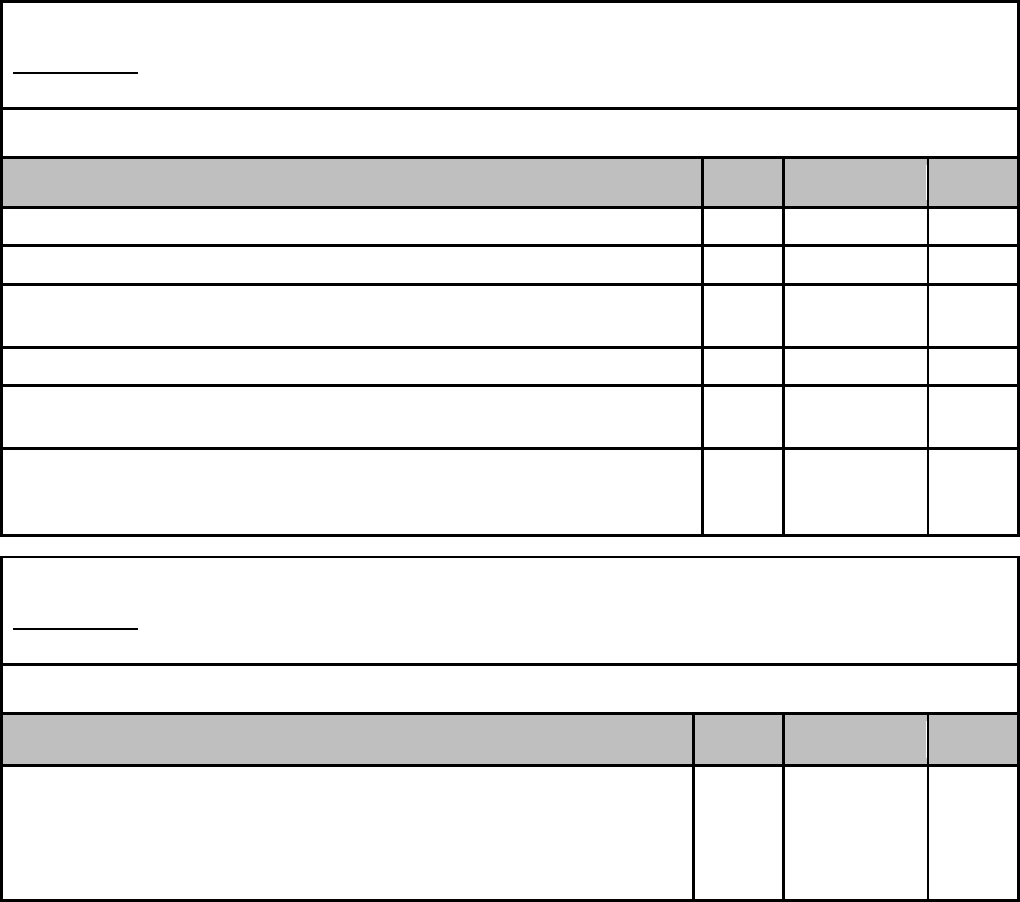
Part III Scoring Worksheet–A
Level 1
Meets Criteria
Scoring Criteria—Level 1
Yes
Somewhat
No
Minimally develops some aspects of the task
Is descriptive; may lack understanding, application, or analysis
Makes vague, unclear references to the documents or consists primarily
of relevant and irrelevant information copied from the documents
Presents no relevant outside information
Includes few relevant facts, examples, and details; may include
inaccuracies
May demonstrate a weakness in organization; may lack focus; may
contain digressions; may not clearly identify which aspect of the task is
being addressed; may lack an introduction and/or a conclusion
Level 0
Meets Criteria
Scoring Criteria—Level 0
Yes
Somewhat
No
Fails to develop the task or may only refer to the theme in a general
way; OR includes no relevant facts, examples, or details; OR includes
only the historical context and/or task as copied from the test booklet;
OR includes only entire documents copied from the test booklet; OR is
illegible; OR is a blank paper
*This worksheet is designed to help you understand the specific scoring criteria detailed in the scoring
rubric. It is important to remember that these criteria exist within a holistic scoring system that is intended
to view the student’s response in its entirety and then assign an appropriate score.
26

Part III Scoring Worksheet–B
Directions: Read the sample paper and check the appropriate Score Level for each Scoring Criteria
*
.
Score Level (Scoring Criteria) Yes
• Bullet 1: Degree to which the task is accomplished
Level 5: Thoroughly develops all aspects of the task evenly and in depth
Level 4: Develops all aspects of the task but may do so somewhat unevenly by discussing one
aspect of the task less thoroughly than the other aspects of the task
Level 3: Develops all aspects of the task with little depth or develops at least three aspects of
the task in some depth
Level 2: Minimally develops all aspects of the task or develops at least two aspects of the task
in some depth
Level 1: Minimally develops some aspects of the task
• Bullet 2: Degree to which the student uses analysis in the response
Level 5: Is more analytical than descriptive
Level 4: Is both descriptive and analytical
Level 3: Is more descriptive than analytical
Level 2: Is primarily descriptive; may include faulty, weak, or isolated application or analysis
Level 1: Is descriptive; may lack understanding, application, or analysis
• Bullet 3: Degree to which document information is used in the response
Level 5: Incorporates relevant information from at least four documents
Level 4: Incorporates relevant information from at least four documents
Level 3: Incorporates some relevant information from some of the documents
Level 2: Incorporates limited relevant information from the documents or consists primarily of
relevant information copied from the documents
Level 1: Makes vague, unclear references to the documents or consists primarily of relevant
and irrelevant information copied from the documents
27

Part III Scoring Worksheet–B
• Bullet 4: Degree to which accurate outside information is used in the response
Level 5: Incorporates substantial relevant outside information
Level 4: Incorporates relevant outside information
Level 3: Incorporates limited relevant outside information
Level 2: Presents little or no relevant outside information
Level 1: Presents no relevant outside information
• Bullet 5: Degree to which ideas are supported with facts, examples, and details
Level 5: Richly supports the theme with many relevant facts, examples, and details
Level 4: Supports the theme with relevant facts, examples, and details
Level 3: Includes some relevant facts, examples, and details; may include some
minor inaccuracies
Level 2: Includes few relevant facts, examples, and details; may include some inaccuracies
Level 1: Includes few relevant facts, examples, and details; may include inaccuracies
• Bullet 6: Degree to which the essay is organized and developed
Level 5: Demonstrates a logical and clear plan of organization; includes an introduction and a
conclusion that are beyond a restatement of the theme
Level 4: Demonstrates a logical and clear plan of organization; includes an introduction and a
conclusion that are beyond a restatement of the theme
Level 3: Demonstrates a satisfactory plan of organization; includes an introduction and a
conclusion that may be a restatement of the theme
Level 2: Demonstrates a general plan of organization; may lack focus; may contain digressions;
may not clearly identify which aspect of the task is being addressed; may lack an
introduction and/or a conclusion
Level 1: May demonstrate a weakness in organization; may lack focus; may contain digressions;
may not clearly identify which aspect of the task is being addressed; may lack an
introduction and/or a conclusion
*This worksheet is designed to help you understand the specific scoring criteria detailed in the scoring
rubric. It is important to remember that these criteria exist within a holistic scoring system that is intended
to view the student’s response in its entirety and then assign an appropriate score.
28
Anchor Paper—Level 5
‘Conquest’ is a word people often find unnerving when referring to their nation’s own actions so
instead they justify actions such as imperialism in more positive terms. Though ‘conquest’ doesn’t
necessarily have any bad meaning other than ‘taking over forcefully’, some have used the terms
‘expansion’ or ‘imperialism’ as replacements. In the course of United States history, we have done a lot
to expand our territory. From the earliest east coast settlements in Jamestown and Plymouth we moved
into the northwest and past the Ohio River Valley. With the purchase of Louisiana we began our manifest
destiny, which eventually took us to California and the Pacific Ocean. With the treaty ending the
Mexican-American War we had created an American Empire. This expansion has come at the cost of
many indigenous peoples and often disrespect for the original inhabitants who were denied self-
government. Having reached the west coast and having erased the frontier line by 1890, some thought it
was time for manifest destiny beyond the continental United States. Imperialism would become a heated
issue during the late 1800s as many American people, organizations, and political parties shed light on
the issue, allowing everyday people to see both the good and the bad sides of imperialism.
United States interest in imperialism truly began at the end of the 19
th
Century. Following the post
Civil War technological and manufacturing boons, America had more resources to trade and more
transport and technology to make it more efficient (Document 1). With their sights set on profit and with
unspoken support from the US government, individuals and businesses spread their interests across the
globe, setting up the possibility of annexing promising new areas for America. For many years Americans
owned most of the sugar plantations in Hawaii and felt it was in their best economic interests for the
United States to annex the islands. Hawaiian rulers were opposed to this and the military force used
against them. This is where imperialism finds its opponents. Some would argue that this is where we
could have continued a peaceful trading partnership built on reciprocating wealth and mutual benefit, but
American planters and others wanted to ensure their future profits. Opponents of annexation with
President Cleveland leading the way won the debate when it became obvious that Hawaii did not want to
become part of the United States. Hawaii is an example of how controversial imperialism could be. Left
no other choice, the monarch abdicated and the U.SA. eventually gained a new territory. After this war,
the debate over imperialism grew when the US Senate was considering the Treaty of Paris ending the
Spanish-American War. The Senate did ratify the Treaty of Paris and America gained Puerto Rico,
Guam, and the Phillipines. This resulted in force being used “to subjugate” the Phillipines when the
U.S.A. refused self-governance for the Fillipino people. Anti-imperialists viewed this “as hostile to
29
Anchor Paper—Level 5
liberty”, especially considering our beliefs about “consent of the governed”. The Democratic Party
agreed, believing that our action which resulted in a long, expensive, and brutal war was “criminal
aggression” (Documents 4a and 4b). The Republican Party supported President McKinley’s decision to
keep the Phillipines and believed the United States had a responsibility to “confer the blessings of
liberty…upon rescued people” (Document 5). Although the United States “rescued” the Phillipines from
Spain, Fillipinos had expected they would get their independence from the United States who had once
gained their own independence from a colonial power. An armed revolt led by Aguinaldo was crushed by
the United States using military force (Document 5). The United States government believed it was in the
Phillipines best interest not to be independent. Such travesties could have been avoided if the United
States was sincere about honoring its democratic values. Imperialism let America build up an empire that
successfully competed with its European counterparts.
There was disagreement about imperialism within political parties, between parties, and throughout
the nation (Document 1). However, the depression of the 1890s encouraged many Americans to be open
to the economic arguments of expansionists. We needed new markets where we could sell the excess
goods being manufactured and the overproduced crops of farmers. The “March of the Flag” speech given
by Albert Beveridge encouraged Americans to think about the “reciprocal” trade that would result from
expansion into Puerto Rico and the Phillipines. Annexing the Phillipines would put us into Asia and
create even more valuable commercial activities (Document 3), especially after the Open Door Policy
was issued. Henry Cabot Lodge made a prediction that expansion would bring great “benefits” to our
trade, our industry, and our labor (Document 6). Expansion could do a lot to revive and expand our
economy and it did. Political cartoonists such as Victor Gillam expressed expansionist viewpoints as
well. His cartoon was a good reminder that expansion was nothing new and it started in 1783 (Document
2). There had been debates over the purchase of Louisiana and the annexation of Texas, just as there were
debates over the Phillipines in 1899. However, the expansionists won and we expanded westward to the
Pacific and overseas. Territorial expansion led to great national wealth (Document 6b). That prosperity
led to doing good for other nations, saving democracy from Fascist dictators in the 20
th
century, and
victory in the Cold War.
The national wealth of the United States led to other forms of imperialism in the 20
th
and 21
st
centuries. Although the US does not acquire territories as it did in the 1890s, it has economic power in
30
Anchor Paper—Level 5
many countries around the world. This gives the United States almost as much influence in those
countries as if they were part of a formal empire.
31

Anchor Level 5
The response:
• Thoroughly develops all aspects of the task evenly and in depth
• Is more analytical than descriptive (imperialism a heated issue during late 1800s as many American
people, organizations, and political parties shed light on issue allowing the everyday person to see
both the good and the bad sides of imperialism; Hawaii an example of how controversial imperialism
could be; United States government believed it was in Philippines’ best interests to not be
independent; imperialism let America build up empire that successfully competed with European
counterparts; needed new markets where excess manufactured goods and overproduced crops could
be sold; Albert Beveridge encouraged Americans to consider that reciprocal trade would result from
expansion into Puerto Rico and Philippines; prosperity led to doing good for other nations, saving
democracy from fascist dictators in 20th century, and victory in Cold War)
• Incorporates relevant information from all the documents
• Incorporates substantial relevant outside information (from earliest East Coast settlements America
moved into northwest and past Ohio River valley; treaty ending Mexican-American War created an
American empire; expansion came at cost of many indigenous peoples and disrespect for original
inhabitants who were denied self-government; having reached West Coast and having erased frontier
line by 1890 some thought it was time for Manifest Destiny beyond continent; with sights set on
profit and unspoken support from government, individuals and businesses spread interests across
globe setting up possibility of annexing promising new areas; for many years Americans owned most
of sugar plantations in Hawaii and felt in their best economic interests for United States to annex
islands; Hawaiian rulers opposed annexation and the military force used against them; some would
argue United States could have continued peaceful trading partnership built on reciprocating wealth
and mutual benefit but American planters and others wanted to ensure profits; with President
Cleveland leading way opponents of annexation won debate when it was obvious Hawaii did not want
to become part of United States; Filipinos expected to get independence from United States who had
once gained independence from colonial power; armed revolt led by Aguinaldo of Philippines crushed
by United States; depression of 1890s encouraged many Americans to be open to economic
arguments of expansionists; annexing Philippines would put United States into Asia and create even
more valuable commercial activities especially after Open Door policy)
• Richly supports the theme with many relevant facts, examples, and details (Jamestown and Plymouth;
United States gained Puerto Rico, Guam, and Philippines with ratification of Treaty of Paris;
Republican Party supported President McKinley’s decision to keep Philippines; disagreement about
imperialism within political parties, between parties, and throughout nation; Gillam’s political cartoon
a reminder that expansion nothing new and started in 1783; debates over purchase of Louisiana and
annexation of Texas just as debates over Philippines)
• Demonstrates a logical and clear plan of organization; includes an introduction that addresses United
States expansion from colonial times to imperialism of the 1890s and a conclusion that discusses how
the economic power of the United States in the 20th and 21st centuries gives the United States almost
as much influence in countries as if they were part of a formal empire
Conclusion: Overall, the response fits the criteria for Level 5. Document interpretation is supported by
good historical references and leads to analytic conclusions throughout the response. Integration of efforts
to address the issue of imperialism and the evaluation of those efforts effectively establishes the course of
imperialism in the 1890s as an important civic issue.
32
Anchor Paper—Level 4
Throughout the History of the US, one major topic of discussion involving constitutional and civic
issues is imperialism. Imperialism has a long controversial history. It has been discussed by many people
and groups multiple times. The issue of imperialism is important in American history.
The United States experiences with imperialism happened over a long time. In fact, the nation was
founded on the basis of imperialism by the British, who it rejected in 1776. At first, America was 13 states
in 1783, with an area of 349,849 miles, but gradually, the US obtained more territory, until they reached 48
states in 1898. Also in 1898, the US annexed the territory of Hawaii outside the continental United States.
This added to the 48 states we had and brought the square mileage to 3,601,270. (Doc 2). Imperialism had
become an issue when anti-imperialists opposed Hawaiian annexation in the early 1890s. The US became
interested in Hawaii for economic reasons and for the port at Pearl Harbor. An important reason for this
interest in acquiring territory could be related to finding “markets capable of absorbing the [U.S.]’s excess
stock of manufactured goods” (Doc 1). Another reason was to obtain raw materials for investment purposes
(Doc 3, 1). An important force that encouraged this idea of imperialism was that we had achieved ‘Manifest
Destiny’. Americans successfully gained control of much of the North American continent to the Pacific.
After Napoleon, dictator of France, sold Louisiana to Thomas Jefferson in 1803, US confidence continued
to grow after every new acquisition. After the territories on the west coast had been acquired, the US was
on its way to becoming a world power. To become a world power the US would have to compete
successfully with European countries and acquire its own colonies. The domestic wealth of the US would
be increased by colonial possessions that would provide markets and investment opportunities. Some
individuals, however, thought that the US shouldn’t try to reach beyond its borders to gain territory. George
Washington had advised caution in his Farewell Address, which led to little interest in overseas expansion.
These pro-expansionists and anti-expansionists continued to disagree, and their efforts to address the issue
got more intense after the Spanish American War.
The issue of imperialism has been debated over multiple years by many different individuals and
groups in an effort to address the situation. Those who say imperialism is necessary, say that the resources
found in territories such as Cuba, Puerto Rico and the Philippines are too valuable for the US to ignore. The
US had to make the most out of opportunities and not be cut out by other colonial powers. Albert Beveridge
in his “The March of the Flag” speech supported expansion and urged people who also supported it to
support him for senator (Doc 3). Others say that it is immoral to support the policy of imperialism, saying
that the US has now become like the British. Using imperialism to gain resources to help support the
33
Anchor Paper—Level 4
mother country had seemed wrong to the independent minded colonists and was still wrong. The belief in
the strong ruling over the unwilling went against American beliefs, according to anti-expansionist Carl
Schurz (Doc 4a). Another claim is that imperialism goes against the Constitution (Doc 4b). The Anti-
Imperialist League and the Democratic Party opposed the government’s decision to not give independence
to the Philippines and the resulting “war of criminal aggression” against the Filipinos. Both groups hoped
to convince Americans that imperialism was “hostile to liberty” and would lead to “despotism at home”
(Doc 4a, 4b). The pro-imperialist Republican Party argued the US had the responsibility to provide good
government in countries such as the Philippines. The pro-Empire effort won the debate at the end of the
Spanish American War.
Imperialism has been influential in the history of the United States. Some nations under U.S.
acquisition tried to rebel, such as the Philippines, which can be mirrored in Britain’s relation with the 13
colonies before the United States’ independence (Doc 5). The war against the Filipinos cost many lives and
millions of dollars, and according to the Democrats cancelled trade profits for years (Doc 4b). An increase
in trade on the Pacific Ocean, as seen in Document 6a, increased our national wealth. This increase in trade
also led to the cultural diffusion of our ideas, products and culture to other places. Another longer term
impact of imperialism specifically involves Cuba. We fought Spain to free Cuba, but made Cuba a
protectorate. When the protectorate ended, we still kept a naval base at Guantanamo, which became an
issue after the Cuban revolution. The Soviet Union and Cuba became Communist partners, which led to the
Cuban Missile Crisis and a Cold War crisis, which impacted the U.S.’s image around the world. Some pro-
expansionists point out, however, that the United States acquiring territory can lead to nations receiving
educational, and medical help, as well as a better system of justice (Doc 6b). The US policy of imperialism
did in some ways benefit the world.
Imperialism is an issue with a long past, in which many individuals argue whether it is good or not, in
an attempt to regulate it. It is unquestionable, however, that imperialism has had a big impact on the US.
34

Anchor Level 4
The response:
• Develops all aspects of the task
• Is both descriptive and analytical (United States confidence grew with every new acquisition; after
acquiring territories on West Coast, United States on way to becoming world power; United States
would have to compete successfully with European countries and acquire its own colonies; pro-
expansionists believed resources found in territories such as Cuba, Puerto Rico, and Philippines too
valuable to ignore; United States had to make most of opportunities and not be cut out by other
colonial powers; anti-imperialists claimed United States would be governing the unwilling which
goes against American beliefs; both Anti-Imperialist League and Democratic Party hoped to convince
Americans imperialism hostile to liberty and would lead to despotism at home; pro-imperialist
Republican Party argued United States had responsibility to provide good government in countries
such as Philippines; increase in trade because of imperialism led to cultural diffusion of American
ideas and products to other places; pro-expansionists said acquiring territory can lead to nations
receiving educational and medical help and better system of justice)
• Incorporates relevant information from all the documents
• Incorporates relevant outside information (imperialism encouraged when United States achieved
Manifest Destiny; domestic wealth would be increased by colonial possessions that would provide
markets and investment opportunities; Washington’s advice in Farewell Address led to little interest
in overseas expansion; opponents said support of imperialism meant we had become like British
whose colonial government Americans had overthrown in 1776; using imperialism to gain American
resources to help support mother country had seemed wrong to independent-minded colonists;
rebellion in Philippines against United States rule can be mirrored in Britain’s relations with 13
colonies before independence; when protectorate over Cuba ended United States kept naval base at
Guantanamo which became an issue after Cuban Revolution; Soviet Union and Cuba became
communist partners which led to Cuban missile crisis and Cold War crisis impacting United States
image around world)
• Supports the theme with relevant facts, examples, and details (America started with 13 states but
reached 48 in 1898; Hawaii annexed in 1898; markets to absorb excess stock of manufactured goods
and to obtain raw materials for investment purposes; issue of imperialism debated over multiple years
by many different individuals and groups; Albert Beveridge supported expansion and urged
supporters to also support him for senator; Anti-Imperialist League and Democratic Party opposed
decision refusing independence to Philippines resulting in war of criminal aggression against
Filipinos; war against Filipinos cost many lives and millions of dollars; increase in trade in Pacific
increased national wealth of United States)
• Demonstrates a logical and clear plan of organization; includes an introduction that is a restatement of
the theme and a conclusion that states whether one believes imperialism is good or bad it has
impacted the United States
Conclusion: Overall, the response fits the criteria for Level 4. Document interpretation is supported by
good relevant outside information throughout the response. Recognizing the contradiction in our own
nation’s attitudes about imperialism leads to analytic conclusions that would have benefited from
additional explanation. While the opposing efforts concerning imperialism are addressed, further
development of the extent to which the efforts were successful would have strengthened the response.
35
Anchor Paper—Level 3
United States foreign policy actions have often had great consequences. The United States employed a
policy of imperialism that was debated by Americans. To some it was exploitation of a territory for their
resources, and to others acquiring territory was important for our national interest and our growing
economy. In some cases, imperialism had a devastating effect on some of our territories, but it impacted the
United States mostly positively.
In the late 1800’s, the United States employed imperialism partly in response to an economic hardship.
According to Document 1, the nation could benefit from new, commercial outlets in foreign nations
following an excess stock of manufactured goods being produced. Additionally, the document states that
the federal government was in favor of expanding into foreign markets that could promote economic
stability and the national interest by creating new opportunities. “Uncle Sam” had long been looking for
new economic opportunities by expanding west even beyond the Pacific coastline to the Hawaiian Islands,
as shown in document 2. By September of 1898, imperialists such as Albert Beveridge were interested in
Cuba, Puerto Rico, and the Phillipines and wanted to compete with Germany, France, Russia, and England
for Asian markets, as shown in document 3. The nation would employ imperialism and expand into
multiple territories over the next few decades, encouraged by winning the Spanish American War and
accepting the responsibility that came with the Treaty of Paris, as said in document 5.
Imperialism became subject to heavy debate in the United States. Document 3, on one hand, shows
how some people such as Albert Beveridge were in support of it to take advantage of natural resources to
increase market influence and to make a profit. On the contrary, document 4a shows how some people who
were against imperialism joined the American Anti-Imperialist League. This group was against the United
States’ using force to enforce the policy, ruling unwilling people. They argued that the United States could
not force itself on another nation because it would be a violation of natural rights that the nation reveres. In
the Declaration of Independence, Thomas Jefferson wrote about natural unalienable rights and the right of
citizens to overthrow a government that was not respecting those rights. The Declaration was used to justify
our Revolution and it encouraged others to rebel as well. Not every nation submitted peacefully to our
imperialism and control. Documents 4 and 5 show that the Phillipines began to wage war on the United
States in a direct rebellion against the decision of the United States to not give them the independence they
had been fighting Spain for. Carl Schurz, a leader of the anti-imperialist movement, made an effort in a
speech given in Chicago to remind people that using the United States military against Filipino
36
Anchor Paper—Level 3
revolutionaries “was disloyal to our principles of government.” This shows that there were contrasting
opinions about imperialism within the United States, that would have long-lasting effects.
Efforts to address imperialism in the 1890s were both successful and unsuccessful. Decisions were
made by the government to continue to fight a war against the revolutionaries in the Phillipines until we
regained complete control over them. We also had responsibility for Guam and the Wake Islands, which we
possessed since the 1890s, as shown in document 6a. Despite the challenges and responsibilities that go
along with having possessions, the United States’ policy of imperialism had many positive effects on the
nation. Document 6a shows that the United States expanded its influence on the market globally, since
many of its possessions were located on trade routes that would increase its economic influence throughout
the world. We gained much national wealth just as the imperialists believed we would. Additionally,
Document 6b recognizes this influence, and it acknowledges that the nation’s wealth helped the United
States win wars and improve people’s lives and the countries we intervened in. Arguably, imperialism
cemented the nations status as a world super power, and the anti-imperialists continued to believe we
achieved that status in the wrong way.
Imperialism, although sometimes devestating to others, helped the United States and influenced its
present day development. In today’s society, people are still torn over the important role played by the
United States and its many global responsibilities.
37

Anchor Level 3
The response:
• Develops all aspects of the task with some depth
• Is more descriptive than analytical (to some imperialism was exploitation of a territory for resources
and to others acquiring territory was important for our national interest and growing economy; United
States imperialism partly a response to economic hardship; government favored expanding into
foreign markets that could promote economic stability and national interest by creating new
opportunities; not every nation submitted peacefully to our control; anti-imperialist leader Carl Schurz
reminded people that using United States military against Filipino revolutionaries was disloyal to our
principles; imperialism helped United States expand its influence on market globally since many of
possessions located on trade routes; gained much national wealth just as imperialists believed we
would; nation’s wealth helped win wars and improve people’s lives and countries we intervened in;
arguably imperialism cemented nation’s status as a world superpower; anti-imperialists continued to
believe United States achieved status in wrong way)
• Incorporates some relevant information from all the documents
• Incorporates limited relevant outside information (Anti-Imperialist League argued United States could
not force itself on another nation because that violated natural rights America revered; in Declaration
of Independence Jefferson wrote about natural unalienable rights and right of citizens to overthrow a
government not respecting those rights; decision made to continue to fight war against revolutionaries
in Philippines until we gained complete control)
• Includes some relevant facts, examples, and details (nation could benefit from new commercial
outlets in foreign nations following excess stock of manufactured goods; United States expanded west
beyond Pacific coastline to Hawaiian Islands for economic opportunities; by 1898 imperialists
interested in Cuba, Puerto Rico, and Philippines and wanted to compete with Germany, France,
Russia, and England for Asian markets; American Anti-Imperialist League opposed using force to
enforce policy that subjugated unwilling people; Philippines began to wage war on United States in
direct rebellion to decision not to grant independence; responsibility for Guam and Wake Islands
which we possessed since 1890s; Hawaii annexed in 1898)
• Demonstrates a satisfactory plan of organization; includes an introduction that states while United
States imperialism had a devastating effect on some of our territories it had a mostly positive impact
on the United States and a conclusion that states people are still torn over the many global
responsibilities of the United States
Conclusion: Overall, the response fits the criteria for Level 3. While document information frames the
response, some analytical statements are included. Important concepts are mentioned in the discussion of
the extent to which efforts were successful but many lack the depth of explanation found in higher level
responses.
38
Anchor Paper—Level 2
The United States has always sought after the acquisition of new territory. In the early days of the
country, the main focus of territorial expansion was the western land in North America. Once the US had
achieved their goal of becoming a transcontinental nation, they turned towards foreign land. Nearing the
turn of the century, the US had control of a significant number of foreign islands and land. The main goal
of overseas expansion was to benefit & further allow their economy to prosper. Although it is true that
these imperialist conquests greatly benefit the prosperity and power of the nation, not all were satisfied.
Many US citizens viewed the imperialist policies as unconstitutional & even inhumane. The roots of this
political disagreement can be found in a disagreement in the value of economic prosperty versus the
concept of equal human dignity.
United States imperialism was, and continues to be a controversial issue in the US. Those in support of
overseas expansion believed the economy would be greatly benefitted by the acquisition of new territories.
For example, Cuba, Puerto Rico, and the Philippines were seen to be worth millions and would open new
doors for commerce (Document 3). The trade opportunities given to the US between 1857 - 1903 had a
profound impact on the country’s overall wealth (Document 6a). The unlimited access to the world’s
markets and resources ultimately allowed the US to become one of the most powerful nations in the world.
The economic prosperity gained during this period of expansion is a major contributing factor to the US
wins in both WWI and WWII (Document 6b). Not only did this expansion benefit the US economy &
world status, but it also influenced other nations to ally with the US, in search for mutual goals & benefits
(Document 2). Although the main backing for US imperialism is for economic gain, many also argued that
American influence would benefit the whole world; either through the introduction of civilization or
through the strengthening of US nation, in turn strengthening their generosity (Doc 6b). This last argument,
however was not bought into by many.
Those who opposed US imperialism viewed these policies as unconstitutional and inhumane. For
example, the Anti Imperialist league saw that expansion was hostile to the liberty of natives (Doc 4a). They
saw that governing or occupying the inhabitants of these acquired territories without their consent was
immoral and contradictory to the founding ideological principles of the US government.
In conclusion, US imperialism in the 1890s was a controversial topic in US history.
39

Anchor Level 2
The response:
• Minimally develops all aspects of the task
• Is primarily descriptive (once United States achieved goal of becoming a transcontinental nation it
turned toward foreign lands; main goal of overseas expansion was to benefit and further allow
economy to prosper; although true that imperialist conquests greatly benefited prosperity and power
of nation not all were satisfied; trade opportunities given to United States between 1857 and 1903 had
profound impact on country’s overall wealth; unlimited access to world’s markets and resources
ultimately allowed United States to become one of most powerful nations; economic prosperity
gained during period of expansion was major contributing factor to wins in World War I and World
War II; expansion influenced other nations to ally with United States in search for mutual goals and
benefits; many argued American influence would benefit whole world either through introduction of
civilization or through strengthening of United States which would strengthen its generosity; anti-
imperialists believed governing or occupying territories without consent of inhabitants was immoral
and contradictory to founding ideological principles of United States)
• Incorporates limited relevant information from documents 2, 3, 4, and 6
• Presents little relevant outside information (roots of political disagreement about imperialism can be
found in disagreement about value of economic prosperity vs. concept of equal human dignity)
• Includes some relevant facts, examples, and details (in early days of country main focus of territorial
expansion was western land in North America; nearing turn of 19th century United States had control
of a significant number of foreign islands and land; many United States citizens viewed imperialist
policies as unconstitutional and even inhumane; those in support of overseas expansion believed
economy would be greatly benefitted by acquisition of new territories; Cuba, Puerto Rico, and
Philippines seen to be worth millions and would open new doors for commerce; Anti-Imperialist
League saw expansion as hostile to liberty of natives)
• Demonstrates a general plan of organization; includes an introduction that summarizes all aspects of
the task and a one-sentence conclusion that notes United States imperialism in the 1890s was a
controversial topic.
Conclusion: Overall, the response fits the criteria for Level 2. Although all aspects of the task are
addressed, the focus on the arguments of those who favor imperialism detracts from the overall coverage.
A few analytic statements are included but lack development. Some information is repetitive, and all
aspects of the task would benefit from further development.
40
Anchor Paper—Level 1
The controversial topic of imperialism sprouted in the late 1800s, bringing many to share their beliefs
in the so-called “American expansion”. Opinions range from imperialism being the United States’ good
deed upon other nations to being unconstitutional and immoral. Individuals, groups, and/or governments
have addressed these issues accordingly.
The pro-imperialism argument focuses on the benefits that both the US and these foreign nations
would receive. The United States could acquire millions of dollars worth of iron and manganese, along with
the delecacies of those nations (coconuts, hemp, sugar) [Doc 3]. In turn, these foreign nations would
receive protection from the United States [Doc 5]. Such a deal seemed fair and righteous, but they failed to
see this as unconstitutional.
The anti-imperialist group points out that this is infringing on the freedoms that these people fought
hard to obtain. [Doc 4a] Not only do they claim it is wrong, because “the constitution follows the flag. . .”
[Doc 4b], these people believe that those who would want to expand the United States are blind with greed.
In the end, it is evident that on a topic such as imperialism, the public opinion is split. This causes
people to express their opinions and act on them, making history in the process. It is important to
understand the compelling arguments that both sides brought forth. Referring to these events in the past we
can better understand how the world we live in today, came about.
41

Anchor Level 1
The response:
• Minimally develops some aspects of the task
• Is descriptive (opinions about imperialism range from being the United States good deed upon other
nations to being unconstitutional and immoral; pro-imperialism argument focuses on benefits that
both United States and foreign nations would receive; foreign nations would receive protection from
United States; imperialism seemed fair and righteous but others saw it as unconstitutional; anti-
imperialists saw imperialism as infringing on freedoms people fought hard to obtain; anti-imperialists
believed imperialists were blind with greed)
• Includes minimal information from documents 3, 4, and 5
• Presents no relevant outside information
• Includes few relevant facts, examples, and details (United States could acquire millions of dollars’
worth of iron and manganese along with delicacies including coconuts, hemp, and sugar; anti-
imperialists claimed constitution followed the flag)
• Demonstrates a general plan of organization; includes an introduction that mentions different beliefs
about imperialism and a conclusion that states looking at imperialism in the past can help one better
understand the world we live in
Conclusion: Overall, the response fits the criteria for Level 1. The discussion focuses on the arguments
of those who favor imperialism and those who do not. Although awareness of the topic is evident,
supporting facts, examples, and details are limited.
42
Practice Paper A
The United States had dealt with many issues to get where it is today and at the turn of the 20
th
century
the debate of imperialism was a major concern.
In 1804, Tomas Jefferson, the president at the time, had bought a single piece of land that nearly
double the size of the country. This Louisana Purchase could be debated as the birth of Manifest Destiny, or
the idea to expand westerward. The US has always grown, as metaphorically displayed in document 2, but
by 1890 the US census declared that the all of the frontier was settled. Missing this fundamental piece of
American identity, the thought of imperialism started to rise.
The thought of imperialism, however, was not unanimously accepted. Some supported it, Albert
Beveridge at the time felt that the resources and the comerce of the new lands will deeply benefit the
country. Others opposed it, saying that “imperialism is hostile to liberty” and that by partaking in this
policy, the US is going against its beliefs of freedom and liberty. (Doc 4a) In the end, the United States
took some foreign land which created some huge impacts.
The most notable impact of imperialism was the new large naval network in the pasific, as displayed
on document 6a. However, potentially unintended side effect is the increase involvent in in foreign affairs.
Supporters of imperialism stated that the “influence would benefit the world” where others were unsure of
that (Doc 6b). Eventually, some of these lands would become countries of their own and others are still US
territories today.
American imperialism was a contriversal topic in its day, and it still effect the US to this day. It could
be argued that the increase in foreign affairs only grew afterwards resulting in the US involvement in the
Cold war. Additionally, the islands claimed in the Pacific led to tensions with to Japan, leading to the US
involvement in World War II.
43
Practice Paper B
The United States government acquired many territories to gain more wealth. The United States
acquired weaker nations sometimes using force to gain new commercial outlets and trade markets. These
acquisitions resulted in much wealth and prosperity for the nation.
Imperialism has been going on throughout history creating large powerful nations and empires. For
example, Spain controlled most of latin America, and Britain acquired colonies in North America. As a
result of America growing in size to 48 states by the 1890s and becoming a larger nation, it became more
interested in getting more territories to add to its wealth and gain the respect of other nations who were
taking land outside their borders (Doc. 2). Also, the economy had slowed down in the early 1890s which
“dictated a search for new commercial outlets” (Doc. 1) to give American businesses the chance to trade in
new places throughout the world (Doc 3). This could improve the national economy and be good for the
national interest (Doc 1), since there might be less unemployment and unrest among workers and farmers.
The United States could gain the respect of other nations like Russia, Germany, Italy, Austria, and Japan, as
the United States took over valuable territories such as Hawaii, which it did in 1898 (Doc 2). Freeing Cuba
from Spain’s rule moved us towards controlling Puerto Rico and the Philippines. The treaty ending the
Spanish-American War deepened a difference of opinion that divided the country into imperialists and anti-
imperialists. Not allowing Cuba or the Philippines to be immediately independent was seen by some as
wrong and out of character for America, while others thought the United States of America could help to
“civilize” other countries and give them “good schools, orderly systems of justice, modern transport
networks, [and] new jobs” (Doc. 6b). Imperialists thought this would be good for those countries and their
resources and markets would be good for us. The United States government also wanted to imperialize in
order to increase its economic growth, political power, and to spread their ideas of western culture and
technology. The disagreements had an effect on many different areas of American life.
The U.S. government sometimes secured nations through the use of force. In the Philippine Islands, the
United States government had to send the army to secure its power and authority over a country that wanted
independence. President McKinley thought it was important to control the Philippines to provide “law and
order and the blessing of liberty” (Doc 5). Others thought the use of force in the Philippines or anywhere
else was unconstitutional. The American Anti-Imperialist League held a conference in Chicago in 1899 and
reminded people that “governments derive their just powers from the consent of the governed” (Doc. 4a).
The use of force in weaker nations against their will was wrong because “might does not make right” (Doc
4a). However, Republicans believed the American public approved of our imperialism because we had to
44
Practice Paper B
take care of weaker countries such as the Philippines. Republicans such as President McKinley began to
like the idea of America becoming a world power and having colonies. Success in our war against the
Filipinos, and our decision to keep Puerto Rico and Guam and as we acquired Samoa and the Wake Islands
(Doc 6a), helped establish the United States as a world power and gain respect for the U.S. government.
Anti-Imperialists in the Democratic Party would argue that just like fighting the Filipinos was expensive it
would also be expensive to take care of all the new territories. When people voted for President or
Congressmen they would have to consider which point of view they agreed with.
The map of United States Territory and Leases (Doc 6a) shows that the efforts of those who wanted
the U.S. to acquire possessions were successful, despite arguments that it was wrong. Anti-imperialist
concerns about “the nation’s limitations outside the hemisphere” (Doc 1) were weakened as the United
States built a large navy. As a result of imperialism, the United States became increasingly wealthy and
gained more respect from other nations. The United States of America acquired enough power and money
to fund the world wars and the cold war. This was evident when the government gave billions of dollars to
nations to help rebuild after the second World War, and contain communism. Our wealth also helped to
fund new technology for the arms race that helped us win the Cold War. The direct result of imperialism
allowed the United States to have access to much of the world’s goods and trade markets. The U.S. nation
also modernized the civilizations in some of its possessions, and was able to help establish their power and
wealth as well.
The United States of America acquired many colonies and trading as a result of imperialism. It slowly
gained power, wealth, and established themselves as a prosperous, powerful nation after eliminating British
control, and becoming an independent nation.
45
Practice Paper C
Americans have not often completely agreed on things. In the start of the nation, it was Federalism vs
Anti-federalism. Later, slavery. In the late 1800’s the main issue was imperialism. Imperialism, like all the
other issues, led to efforts by many groups of people to address it, and had different impacts on the
Country.
In understanding the conflict and outcome sparked by an issue, one must also understand what
circumstances surround the issue. For much of America’s history up until overseas expansionism, it had
been mostly inwardly concerned. Starting out as a union of 13 states in 1783 (Doc 2), we had to worry
about the economic and political stability of our new country. Neutrality and isolation was recommended
by our presidents. The only expansion the US cared about was within the continental US, or what would
come to be it. What came of that was our nation expanding all the way to California after the Mexican-
American War and finally to 48 states in 1898 (Doc 2). After the industrial, technological, and commercial
advancements following the civil war, the United States began to feel the need to look outside its borders.
The US also felt pressured by other nations expanding and their success, fearing being left out and left
behind. These factors led to interest in looking outward and feeling it was the right time for imperialism.
Imperialism had support and opposition in efforts to address it. Supporters, such as Albert Beveridge,
argued that America needed to become expansionist and Imperialist. America could benefit from the
resources and trade offered by new territories to grow economically and its people had as much right to
these markets and resources as any other nation (Doc 3). Others shared this view, especially in politics.
Because of military efforts America acquired territories like Puerto Rico and the Philippines. President
McKinley supported Senate ratification of the Treaty of Paris. In this treaty Spain had to give those
territories to the US after losing the war they fought against us. The Republican Party believed Spain’s
sovereignty throughout the West Indies and in the Philippine Islands had to be destroyed so the US could
take liberty to the countries it had saved (Doc 5). The Republican Party hoped their opinion would get votes
for them. The opposition, however, maintained that imperialism went against liberty and that the
subjugation of other peoples such as in the Philippines not only went against the ideals of the nation, but
was not constitutional because the President or Congress did not have any authority to go beyond what the
Constitution says (Doc 4a & 4b). Groups such as the American Anti-Imperial League attempted to rally
support against imperialism, as they felt this was the best way to address the issue. They tried to get the
46
Practice Paper C
country to understand that our country was not giving independence to the Philippines which they deserved
because they had fought Spain so long for it. The country’s opinions were divided over imperialism.
Efforts to get support for imperialism worked and had a huge impact on trade and the nation’s wealth.
The United State’s imperialist possessions put them on the path of many major trade
networks (Doc 6a). This made them a major trade power in the world and at the time the US could share its
wealth with its possessions. But even America’s generosity was debated, with some thinking it was not
sincere or was done for selfish reasons. Some of the inhabitants of our possessions resented our so called
generosity because they saw it as another way to control them. In more of a long-term view, the United
States was able to reach unmatched levels of national wealth because of their trade power, a prosperity that
also led America to victory in both world wars and the cold war, cementing it as a world power (Doc 6b).
Imperialism’s outcome, as imperialists generally got their way and the US acquired territory, was to propel
the nation to a position of power and wealth; helping to make the country what it is today.
Imperialism in the late 1890s had opposition, but imperialism also had fervent support. The debate
surrounding it was an important and complicated one. Overall, America would not have become the
powerhouse it is if it were not for imperialism.
47
Practice Paper D
Imperialism is a constitutional and civic issue that has been debated greatly by Americans and others.
In U.S. history, these debates have resulted in many various efforts by the government and citizens. These
efforts often impact the American society with varying degrees of success.
In the 1890s, the United States maintained a strong imperialistic policy. This effected our Foreign
relationships as well as our way of thinking in the U.S. While some imperialistic efforts helped our foreign
relationships with Nations such as France, it often resulted in tension with the inhabitants of the land the
U.S. acquisitioned. In document 5, according to the Republican Party the inhabitants of the Philippines
were making war against the United States after our treaty with Spain and the U.S.’s acquisition of the
Philippine Islands. This passage demonstrates precisely how U.S. imperialism can effect foreign relations.
The United States was interested in the policy of imperialism because it appealed to them in many
ways. Albert Beveridge says in document 3 that the resources and the commerce of the United States will
be increased with Cuba and Porto Rico. The U.S. believed they needed the resources that these lands had.
The U.S was interested in imperialism to expand their own land, resources, and power.
48
Practice Paper E
Throughout history powerful countries took land to show their political dominance but also for material
gain. It was said about Great Britain, one of the first great imperialistic powers that “The sun never sets on
their Empire”. America had the first hand experience of being used for natural resources for the British
mercantilist system. America fought the Revolutionary War after Thomas Paine’s “Common Sense” and
Thomas Jefferson’s Declaration of Independence did a lot to convince the colonists that British tyranny was
denying them their natural rights and representation in Parliament. The memory of that treatment continued
and “consent of the governed” and “We the people” became ideals the US Constitution was based on. But this
did not stop the US from eventually becoming interested in expanding its influence. After America completed
its move west to the Pacific Ocean it was not finished with expansion. In the 1890s it became much more
interested in territories outside the United States, sometimes negatively impacting the people who lived there
and losing sight of this idea of “consent of the governed”.
After the American Revolution the US started with its 13 original states but soon the urge to gain more
land took over and the country began to move west. This look westward created a constitutional conflict for
the nation. It started with the Louisiana Purchase which doubled the size of the US in 1803 (Doc 2). Thomas
Jefferson bought it from France, even though this power was not explicitly stated in the constitution. The US
continued to add more territory by getting Spain to cede Florida and then began looking west of the Louisiana
Territory. Years after the Texas Revolution the United States annexed Texas and finally completely achieved
Manifest Destiny in 1848 with US territories stretching all the way to California (Doc 2). The achievement of
Manifest Destiny came with much debate in Congress over whether new territories should be free or slave.
Until we bought Alaska in 1867 the US had not looked to gain land beyond its continental borders but in the
1890s overseas expansion would create more debate. The issue of imperialism started a debate over whether
the US should have an empire with control over people who were not citizens. This was in conflict with the
American ideal of “consent of the governed”. This discussion started when the US became interested in
Hawaii in the early 1890s. Stretching to California as a nation meant that as a nation we were getting
geographically closer to those islands. Since American missionaries and businessmen had lived in Hawaii for
many years it already seemed like Hawaii was ours. With their warm weather it was perfect for growing fruit
and it had a good harbor for merchant ships. Native Hawaiians wanted to control their own country but
American businessmen had their own ideas. They encouraged US troops to end a revolt of Hawaiians and the
troops were successful. Americans living in Hawaii asked the Senate to annex the islands. Hawaii was
annexed in 1898. Anti-imperialists believed “a self-governing state cannot accept sovereignty over an
49
Practice Paper E
unwilling people” (Doc 4a). Expansionists disagreed believing it was America’s duty and destiny to expand.
Better that we take over Hawaii rather than the British or the Germans. The more we expanded the more other
nations would respect us and want to get along with us (Doc 2). Next in 1898 was the Philippines which the
US was interested in for many different reasons. Their natural resources and close proximity with Japan and
China made them valuable to American businessmen. Albert Beveridge felt that it was America’s right to
expand to the Philippines because they were in a good location and the US would be in a better position to
trade with Asian countries. Because the rest of Europe had Asian “doors” opened to them those “doors” had to
be opened to the US (Doc 3). During the Spanish-American War Theodore Roosevelt as Assistant Secretary of
the Navy sent a fleet of ships to defeat a Spanish fleet in the Philippines and after the war the US decided to
annex them. President McKinley believed it was our responsibility to protect the Philippines from other
powerful nations, but the Filipinos thought the US would let them become independent. And when we didn’t
we ended up fighting another war in the Philippines. As the Democrats wrote in 1900 “greedy commercialism
dictated the Philippine policy (Doc 4b)”.
After the Spanish-American War Republican politicians such as Albert Beveridge used campaigning to
convince voters that expansionism would benefit the US. He explained the strategic and economic importance
of Puerto Rico and the Philippines with their ports, resources and trade opportunities (Doc 3). Both places
were included in the Treaty of Paris that President McKinley proposed and both became our possessions after
much debate between the imperialists and anti-imperialists in the Senate. The anti-imperialists argued
unsuccessfully against the Treaty. They believed that places we acquired did not want the US to control them.
This was clear when the Filipinos fought their subjugation (Doc 4a). The debate between the Democratic and
Republican parties over imperialism continued as the war in the Philippines continued and as each side tried to
win votes in the 1900 presidential election (Doc 4b and Doc 5). The Democrats believed the US could not
“long endure half republic and half empire” and thought imperialism would threaten democracy in the US
(Doc 4b). The efforts of the Republican Party and President McKinley to win public support for maintaining
law and order in the Philippines were successful as was the US military in finally ending that revolt (Doc 5).
These efforts established the foundation for the US to become a global military and economic power.
Although the American presence was sometimes resented it often helped the people who lived in imperialized
areas. Sharing medical advances and helping create jobs improved the standard of living. Although
imperialists believed American influence would benefit the whole world (Doc 6b) the anti-imperialists
continued to believe otherwise. Many Americans remained unsure about leaving our tradition of isolation
50

Practice Paper E
behind even as President Theodore Roosevelt exercised his Big Stick diplomacy which continued to expand
US influence in the Caribbean and around the world.
In conclusion the efforts to address imperialism in the 1890s resulted in a national debate about the rights
and wrongs of imperialism. The efforts of those who argued for imperialism influenced American foreign
policy for many decades. However, for both political and economic reasons anti-imperialist ideas helped lead
to independence for the Philippines and statehood for Hawaii after WWII.
Practice Paper A—Score Level 2
The response:
• Minimally develops all aspects of the task
• Is primarily descriptive (United States has always grown as metaphorically displayed in cartoon;
thought of imperialism started to rise because fundamental piece of American identity missing—the
frontier; thought of imperialism not unanimously accepted; Albert Beveridge felt resources and
commerce of new lands would deeply benefit country; others said imperialism is hostile to liberty and
with imperialism the United States is going against its beliefs of freedom and liberty; supporters of
imperialism stated American influence would benefit the world while others unsure of that; results of
imperialism led to involvement in Cold War)
• Incorporates limited relevant information from documents 2, 4, and 6
• Presents some relevant outside information (President Thomas Jefferson bought a single piece of land
that nearly doubled size of country; Louisiana Purchase could be debated as birth of Manifest Destiny
or idea to expand westward; 1890 census declared all of frontier settled; potentially unintended effect
of imperialism is increased involvement in foreign affairs; eventually some imperialized lands would
become countries of their own while others are still United States territories; islands claimed in
Pacific led to tensions with Japan leading to United States involvement in World War II)
• Includes few relevant facts, examples, and details (United States took some foreign land; imperialism
established large naval network in the Pacific for United States); includes an inaccuracy (Louisiana
Purchase of 1804)
• Demonstrates a general plan of organization; includes an introduction that is a brief restatement of the
theme and a conclusion that mentions United States imperialism led to involvement in World War II
and the Cold War
Conclusion: Overall, the response fits the criteria for Level 2. Some relevant outside references and
descriptive statements demonstrate an understanding of historical circumstances; however, the other
aspects of the task focus on general statements or limited document information. While some good
statements are included in the discussion, they would have benefited from additional supporting facts and
details.
51

Practice Paper B—Score Level 4
The response:
• Develops all aspects of the task
• Is both descriptive and analytical (United States acquired weaker nations sometimes using force to
gain new commercial outlets and trade markets; acquisitions resulted in much wealth and prosperity;
interested in getting more territories to add wealth and gain respect of other nations taking land
outside their borders; economy slowed down in 1890s which meant new commercial outlets needed to
give American businesses chance to trade in new places; freeing Cuba from Spain’s rule moved
United States toward controlling Puerto Rico and Philippines; treaty ending Spanish-American War
continued a difference of opinion that divided country into imperialists and anti-imperialists; some
thought United States could help civilize countries and give them good schools, orderly systems of
justice, modern transportation networks, and new jobs; some thought use of force in Philippines or
anywhere else was unconstitutional; some felt use of force in weaker nations against their will was
wrong as might does not make right; Republicans believed American public approved of imperialism
because United States had to take care of weaker countries such as Philippines; Republicans such as
McKinley liked idea of America becoming world power and having colonies; decision to keep Puerto
Rico and Guam and acquiring Samoa and Wake Islands helped establish United States as a world
power; anti-imperialists in Democratic Party argued just like fighting Filipinos expensive it is also
expensive to take care of new territories)
• Incorporates relevant information from all the documents
• Incorporates relevant outside information (Spain active in Latin America and Great Britain in North
America; new trade could improve national economy and be good for national interest since it might
lead to less unemployment and less unrest among workers and farmers; not allowing Cuba or
Philippines to be immediately independent was seen by some as wrong and out of character for
America; in Philippines the United States had to send army to secure power and authority over
country that wanted independence; when people voted for president or congressmen they would have
to consider whether they agreed with imperialists or anti-imperialists; anti-imperialist concerns about
nation’s limitations outside hemisphere weakened as United States built large navy; gave millions of
dollars to nations to help rebuild after World War II and contain communism; wealth of United States
helped fund new technology for arms race that helped win Cold War)
• Supports the theme with relevant facts, examples, and details (America grew to 48 states by 1890s;
United States gained respect of nations such as Russia, Germany, Italy, Austria, and Japan as it took
over valuable territories such as Hawaii; imperialists thought United States would be good for
countries and their resources and markets good for us; President McKinley thought it was important
to control Philippines to provide law and order; American Anti-Imperialist League held conference in
Chicago in 1899 and reminded people governments derive just powers from consent of governed;
map of United States territories and leases shows efforts of those who wanted to acquire possessions
successful; acquired enough power and money to fund world wars and Cold War)
• Demonstrates a logical and clear plan of organization; includes an introduction and conclusion that
discuss the role wealth plays within the United States policy of imperialism
Conclusion: Overall, the response fits the criteria for Level 4. Conclusions demonstrate a good
understanding of how economic factors dominated the imperialism debate in the 1890s. Some analytic
statements support a strong connection between the debate and civic participation; however, additional
analysis and more detailed connections would have strengthened the effort.
52

Practice Paper C—Score Level 3
The response:
• Develops all aspects of the task with some depth
• Is more descriptive than analytical (until overseas expansion United States mostly inwardly
concerned; after industrial, technological, and commercial achievements following Civil War the
United States began to feel need to look outside its borders; felt pressured by other nations expanding
and feared being left out and left behind; led to interest in looking outward and felt it was right time
for imperialism; could benefit from resources and trade offered by new territories; felt Americans had
as much right to markets and resources as any other nation; Republican Party believed Spain’s
sovereignty throughout West Indies and in Philippine Islands had to be destroyed so United States
could take liberty to countries saved; opposition maintained imperialism went against liberty, and
subjugation of other peoples went against ideals of nation and was unconstitutional; anti-imperialists
tried to get country to understand United States not giving independence to Philippines which it
deserved because it had fought Spain so long for it; efforts to get support for imperialism worked and
had huge impact on trade and nation’s wealth; trade meant United States could share its wealth with
its possessions; even generosity was debated with some thinking not sincere or done for selfish
reasons; some inhabitants of our possessions resented our so-called generosity because they saw it as
another way to control them; United States able to reach unmatched levels of national wealth because
of its trade; prosperity led United States to victory in both world wars and Cold War cementing it as a
world power; imperialism helped make country what it is today)
• Incorporates some relevant information from documents 2, 3, 4, 5, and 6
• Incorporates limited relevant outside information (in start of nation disagreements between Federalists
and Antifederalists and over slavery; Americans had to worry about economic and political stability
of new country; neutrality and isolation recommended by early presidents; nation expanded to
California after Mexican-American War; Republican Party hoped opinion on imperialism would get
votes for them)
• Includes some relevant facts, examples, and details (started out as union of 13 states in 1783 and
expanded to 48 states in 1898; Albert Beveridge argued America needed to become expansionist and
imperialistic; because of political efforts America acquired territories such as Puerto Rico and
Philippines; President McKinley supported Senate ratification of Treaty of Paris; Spain had to give
territories to United States after losing war; groups such as Anti-Imperialist League attempted to rally
support against imperialism; United States imperialist possessions put it in path of many major trade
routes which made it a major trade power)
• Demonstrates a satisfactory plan of organization, includes an introduction that is beyond a restatement
of the theme and a conclusion that says imperialism helped America become a powerhouse
Conclusion: Overall, the response fits the criteria for Level 3. The response provides a descriptive
methodical narrative that integrates some document analysis to reach thoughtful conclusions. Limited use
of outside information and a reliance on document information without explanation lessens the
effectiveness of the discussion.
53

Practice Paper D—Score Level 1
The response:
• Minimally develops some aspects of the task
• Is descriptive (United States imperialistic policy affected foreign relationships as well as way of
thinking; while some imperialistic efforts helped foreign relationships they often resulted in tension
with inhabitants of land acquired)
• Includes minimal information from documents 2, 3, and 5
• Presents no relevant outside information
• Includes few relevant facts, examples, and details (in 1890s the United States maintained a strong
imperialistic policy; inhabitants of Philippines making war against United States; Albert Beveridge
stated resources and commerce would be increased with Cuba and Puerto Rico)
• Demonstrates a general plan of organization; does not clearly identify which aspect of the task is
being addressed; includes an introduction that is a restatement of the theme and a one-sentence
conclusion that states the United States was interested in imperialism to expand their land, resources,
and power
Conclusion: Overall, the response fits the criteria for Level 1. Two of the three aspects of the task are
superficially addressed with general statements that lack supporting facts and details. Isolated summaries
of information from documents form the basis of the response, and the extent to which specific efforts
were successful is not addressed.
54

Practice Paper E—Score Level 5
The response:
• Thoroughly develops all aspects of the task evenly and in depth
• Is more analytical than descriptive (powerful countries took land to show political dominance and for
material gain; after America completed move west to Pacific Ocean it became more interested in
territories outside United States; debate over whether United States should have empire with control
over non-citizens because it conflicted with idea of consent of governed; anti-imperialists believed
self-governing state cannot accept sovereignty over unwilling people but expansionists believed it
was America’s duty and destiny to expand; Albert Beveridge felt it was right to expand to Philippines
because location would put United States in better position to trade with Asian countries; Democrats
believed United States could not long endure half republic and half empire and thought imperialism
would threaten democracy; although American presence sometimes resented it often helped people
who lived in imperialized areas by raising standard of living with medical advances and job creation)
• Incorporates relevant information from all the documents
• Incorporates substantial relevant outside information (America had firsthand experience of being used
for natural resources in British mercantilism; Manifest Destiny achieved in 1848 with territories
stretching to California; missionaries and businessmen living in Hawaii for years encouraged United
States troops to end revolt of Hawaiians and troops were successful; expansionists believed it was
better for United States to take over Hawaii than British or Germans; natural resources of Philippines
and close proximity to Japan and China made them valuable; during Spanish-American War,
Assistant Secretary of Navy Theodore Roosevelt sent fleet of ships to defeat a Spanish fleet in the
Philippines; President McKinley believed it was our responsibility to protect Philippines from other
powerful nations; anti-imperialists argued unsuccessfully against Treaty of Paris; many Americans
remained unsure about leaving behind tradition of isolation even as President Theodore Roosevelt
exercised Big Stick policy which continued to expand influence in Caribbean and around world; for
both political and economic reasons anti-imperialist ideas helped lead to independence for Philippines
and statehood for Hawaii after World War II)
• Richly supports the theme with many relevant facts, examples, and details (after American Revolution
United States started with 13 original states; Thomas Paine’s Common Sense and Thomas Jefferson’s
Declaration of Independence; Louisiana Purchase doubled size of United States in 1803; continued to
add more territory by getting Spain to cede Florida and then began looking west of Louisiana
Territory; Texas annexed years after Texas Revolution; although delayed Hawaii annexed in 1898;
strategic and economic importance of Puerto Rico and Philippines with ports, resources, and trade
opportunities and both included in Treaty of Paris; Filipinos fought subjugation by United States;
United States military finally ended revolt in Philippines)
• Demonstrates a logical and clear plan of organization; includes an introduction that summarizes how
America’s experience as British colonies influenced its policy of imperialism and a conclusion that
discusses how efforts to address imperialism in the 1890s resulted in a national discussion about the
rights and wrongs of imperialism
Conclusion: Overall, the response fits the criteria for Level 5. Substantive relevant details support
document interpretation in an analytic discussion. Thoughtful conclusions reflect a good historical
understanding about the irony of American colonists decrying British tyranny in the 1770s but the United
States subjugating others during the 1890s.
55
